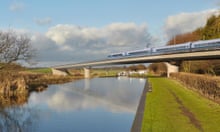What does “levelling up” mean? The prime minister has faced repeated accusations that his ambitions are rhetoric rather than reality. Downing Street said his speech on Thursday in Coventry was setting out a vision, with a white paper to come later this year. It did include some clear ambitions, however there has already been controversy.
Regional devolution
Boris Johnson said he would not take a “one-size-fits-all” approach to devolution but was willing to offer the rest of England the same powers that metro mayors have gained over things such as transport, skills and economic support.
How that will work is vague – Johnson effectively said he was open to ideas, telling people to email him if they wanted devolved power for a specific purpose, such as improving bus services. But the prime minister suggested he was only after those of a certain political persuasion – saying “the loony left remains pretty loony” – which will raise questions about whether all political parties will have the same chance at securing devolved powers for their areas.
High streets
The regeneration of the high street is a significant vote driver – empty shops are a key concern of voters. Much of the prime minister’s high street strategy has been previously announced, but it is designed to tempt people back to their city centres after a pandemic in which online shopping has flourished, including allowing more alfresco dining.
The big controversy is a newly expanded planning flexibility making it easier to convert empty high street shops into homes. However, campaigners are concerned the change could lead to a new wave of poor-quality housing and threaten high streets.
They say many existing shops are totally unsuited to being turned into homes, with problems such as a lack of privacy or poor insulation. Earlier this year in Leicester, a developer wanted to convert the rear of a chip shop into single-room flats, the smallest of which would be 7.7 sq metres.
Town deals
The town deals scheme – which is intended to boost investment and jobs – has been a controversial project that critics say amounts to little more than handing out rewards to Tory or marginal seats that are electorally valuable. Fifteen more have been announced, including a number of marginal seats such as Crewe, Dudley and Blyth.
In the first round of funding, 39 of the 45 places to receive a share of the first £1bn are represented by Tory MPs. Rishi Sunak’s own constituency of Richmond in North Yorkshire, and those of other cabinet ministers, were put in the top tier to receive money.
Transport
Johnson’s personal enthusiasm for levelling up is mainly wedded to building things – infrastructure projects and transport – something he was famously keen on as mayor of London. His most outlandish ideas have been for bridges to Northern Ireland and France but in the meantime one of the key levelling up projects that was announced in the budget is the £4.2bn city region sustainable transport fund.
The aim is for eight English areas, including the West Midlands, Greater Manchester, Liverpool and the west of England, to build transport systems to rival London’s, with investment in new metro or light rail systems, contactless ticketing, new cycle lanes, and measures to tackle congestion and pollution.
But the government has already had to review another key transport pledge – its £27bn roadbuilding strategy – because of climate commitments, after campaigners launched a legal challenge.










